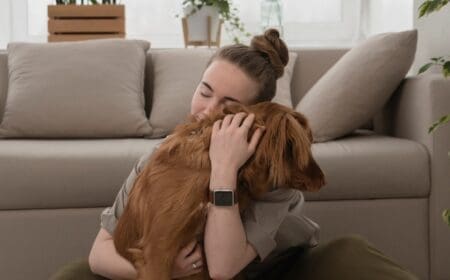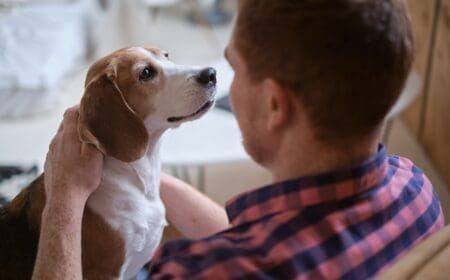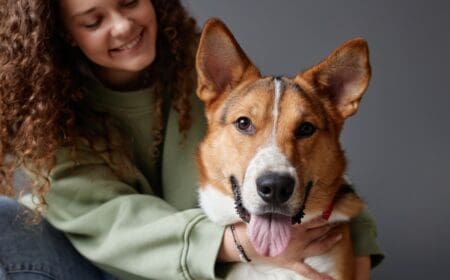Emotional support animals (ESA) provide comfort and support to those who deal with certain mental health conditions or disabilities. Their presence can have many benefits, and because of this, they are protected under certain federal and state laws.
If you are considering adding an emotional support animal to your treatment plan, it’s important to be familiar with federal regulations and Iowa’s state laws surrounding your ESA rights. Our full guide gives you an overview of everything you need to know.
What Is an Emotional Support Animal in Iowa?
Emotional support animals are assistance animals that provide comfort to those dealing with mental health conditions or other disabilities. Some examples of conditions that benefit from an emotional support animal include anxiety, depression, PTSD, autism spectrum disorder (ASD), and stress disorders.
ESAs are not specially trained, and their presence alone is enough to provide some relief from negative emotions or other symptoms of a mental health condition. Not only that, but ESAs require care and can help their owners establish and maintain a routine, including incorporating more exercise in their day, something that has numerous health benefits.
While dogs and cats are common emotional support animal choices, your ESA can be any kind of animal, including snakes, rabbits, fish, and birds. As long as the animal is legal to own in Iowa and you can properly take care of it in your chosen housing, it is qualified to be your ESA.
Emotional Support Animals Versus Service Animals
Even though emotional support animals can have major impacts on an individual’s mental health, they are not considered service animals. ESAs are treated differently from service animals, and they have a different definition and legal protections.
Under the Americans with Disabilities Act (ADA), service animals are dogs, and sometimes miniature horses, that have been trained to directly help with a person’s disability or mental health condition. This involves performing tasks for their owner, such as guiding their owner, comforting them during a panic attack, or retrieving medication and phones.
On the other hand, emotional support animals can be any animal, not just dogs, and they are not specifically trained to help their owner’s condition. Instead, they provide their benefits through their presence in their owner’s life.
Service animals are granted more public access rights and other federal protections due to their training and the need of individuals to be accompanied by their service animals everywhere they go in order to benefit from them.
Your Overview of Iowa Emotional Support Animal Laws
Iowa state laws uphold the protections put in place by federal regulations for these companion animals. Below, we give you an overview of laws that apply to your ESA in the state.
Iowa ESA Public Access Laws
Unlike service animals, ESAs are not given wide-reaching and protected public access rights. This means you will not be able to take your ESA with you to restaurants, department stores, or other businesses. The only public places your ESA will be allowed are pet-friendly locations like pet stores, parks, and sometimes restaurant patios.
If you want to take your ESA somewhere, but you aren’t sure whether or not the business is pet-friendly, try calling ahead. Some businesses do allow pets inside their stores on a case-by-case basis.
Never try to insist that your emotional support animal accompanies you into a private or public space that is not pet-friendly, as this can result in stress for both you and your companion animal.
Keep in mind that if you have a non-traditional ESA, like a snake or a bird, it might be harder to bring them to pet-friendly spaces or request that businesses make an exception to their pet rules for your animal.
Iowa ESA Travel Laws
In the past, the Air Carrier Access Act (ACAA) protected both ESAs and service animals and allowed them to travel in airplane cabins with their owners. However, changes to this law went into effect in January 2021, and now only service animals are allowed to travel in airplane cabins.
That being said, it’s still possible to take your emotional support animal onto a plane – you just need to be prepared for them to be treated as a regular pet would be.
Animals that are small enough may be permitted in a carrier at your seat, while larger animals and non-traditional animals might need to be transported as cargo. Always check specific airline rules for traveling with animals before booking a ticket for you and your ESA.
As for other types of transportation in Iowa, emotional support animals do not have public access rights to buses, trains, or taxis. You will need to check the pet policy of the company providing the transportation before boarding with your ESA.
Some companies may allow pets in carriers, whereas others may not be able to provide accommodation. However, remember that accommodations are up to the transportation company, and they have every right to tell you that you cannot bring your ESA into their vehicle.
Iowa ESA Workplace Laws
Iowa has no laws that allow people to take their ESAs to work with them, and the ADA only protects service animals and their right to accompany their owner in the workplace. Therefore, it would be completely up to your employer whether or not they are okay with allowing you to bring your emotional support animal to work.
If your ESA is well-behaved, you’ll have a better chance of taking them to work with you because they won’t distract other workers. Of course, some employers simply won’t be okay with it; your ESA could pose a hygiene risk or safety hazard in some cases, especially if you work in the food or medical industry.
Iowa ESA Housing Laws
Under the Fair Housing Act (FHA), emotional support animals can live in any rental property, including rentals that don’t allow pets, free of charge. Landlords are not allowed to charge you a pet deposit or a pet rental fee for an emotional support animal, and breed and size restrictions do not apply to emotional support animals
For example, if your ESA is a pit bull but the rental property you wish to live in has banned pit bulls, that ban does not apply to you because your pit bull is an ESA. Similarly, if the rental only allows pets under 30 pounds but your ESA exceeds that number, you’ll still be allowed to live in the rental.
However, to live with your ESA, you will need proof that your ESA is valid. You will need to obtain a valid Iowa ESA letter written by a licensed mental health professional in Iowa.
If they feel that you could indeed benefit from an ESA, then they will approve the addition of a companion animal to your treatment plan and write a letter stating your need. You will then show this letter to your landlord or property manager as you request accommodations for your emotional support animal.
What Animals Make the Best ESAs in Iowa?
Any animal that is legal to own can be an ESA in Iowa, though the best animal for you will depend on your preferences and needs.
Perhaps you prefer a smaller animal because you travel a lot and want to be able to take your ESA onto an airplane, or maybe you need a low-maintenance animal to be your ESA because you don’t have much free time to spend on pet care.
On the other hand, you might want an animal that requires more attention because you enjoy interacting with them and would prefer an animal that wants to interact often or one that gets you outside of the home.
In general, dogs, cats, rabbits, snakes, birds, and fish are the most popular options for emotional support animals in Iowa.
How Do I Get an ESA Letter in Iowa?
Obtaining an ESA letter in Iowa is essential if you wish to request housing accommodations for your companion animal.
The only person authorized to prescribe an ESA is a mental healthcare provider licensed in the state of Iowa. You will need to make an appointment either in person or via telehealth to discuss your symptoms and desire for an ESA.
If you don’t already have a mental healthcare professional licensed in Iowa but you’re seeking an ESA letter, we can help. All you need to do is fill out our ESA consultation form and then we can connect you with an Iowa-licensed professional. They can assess whether you qualify for an ESA letter.
During your appointment, your provider will evaluate your condition and make sure that you can physically and mentally take care of your chosen ESA. From there, they will either approve or deny your request for an emotional support animal. If you are approved, they will write you an ESA letter, and you can use this document to request accommodations.
Can My ESA Be Denied Accommodation?
While your emotional support animal housing rights are protected, there are some situations where a landlord can deny your accommodations request. In general, these situations include the following:
- You do not have a valid ESA letter
- Your ESA cannot be accommodated by the landlord due to undue financial burden for the landlord
- Your ESA poses a direct threat to the health or safety of others around the property
- Your ESA causes serious damage or destruction to the property
- You are attempting to make an unreasonable accommodations request, such as living with an illegal animal or a small horse inside a studio apartment
Beyond these reasons, there are not too many other situations in which your landlord can deny your ESA housing accommodations as needed. Consult with a lawyer if you feel like your rights are not being honored.
Will I Need to Renew My ESA Letter in Iowa?
In Iowa, ESA letters typically have an expiration date of around a year. However, some letters don’t expire until two years after they are written by your provider. You can check the expiration date of your letter and be sure to renew it as needed; updating your ESA letter is the best way to ensure your companion animal stays valid and you can keep the housing accommodations you need.
Abiding By ESA Laws in Iowa
Emotional support animals change the lives of many by providing their owners with comfort via companionship. In Iowa, emotional support animals are granted specific protections by state laws and the federal Fair Housing Act.
If you want to add an emotional support animal to your treatment plan, reach out to a licensed mental healthcare provider today to learn more about how an ESA might benefit you.




